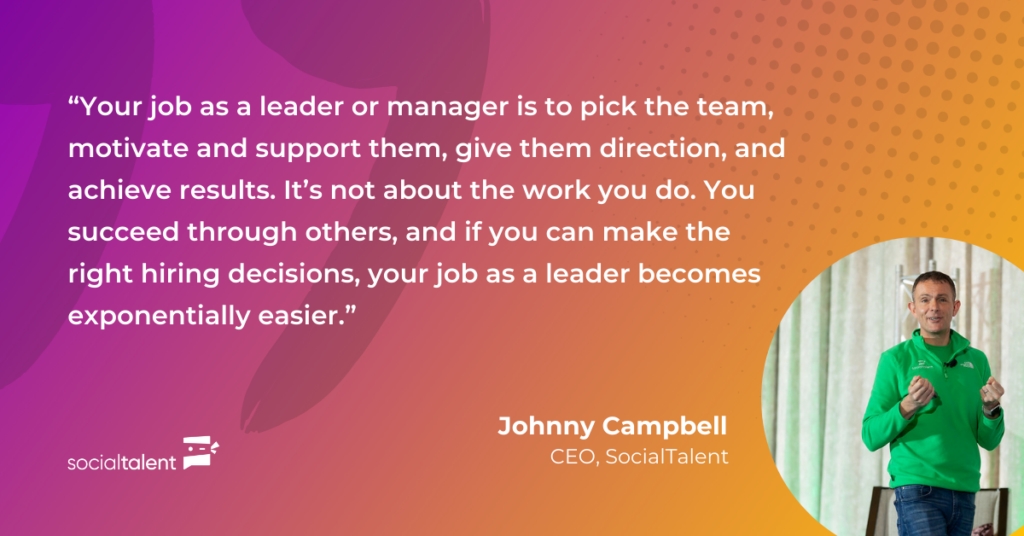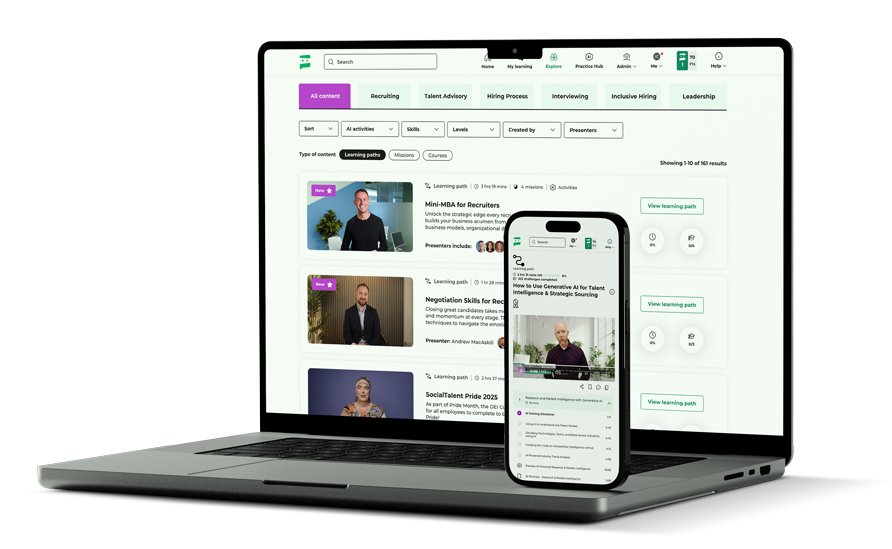
By Johnny Campbell
Last week I was in London for SaaStr Europa. I love this event – it’s a phenomenal playground for B2B Founders and Execs to meet and share ideas on all aspects within this wide-ranging industry. Every session was fuelled with ingenuity as each respected leader dug down into the different ways they were driving success. But do you know what the most common thread was amongst these talks?
How the single most important job a leader or manager has is hiring.
It came up in many guises over the course of the two days. Sam Blond, Partner at Founders Fund, for example, talked about how he feels that founders shouldn’t outsource hiring until they’ve achieved their first 100 hires. Why? To set the foundation for a new company’s culture and inculcate the importance of having the right people.
An interesting (and I’m sure, divisive!) approach, but it underlines the core concept that hiring must be a priority for every leader. I’ve always advocated for this – and it’s a big reason why I feel so passionate about helping organizations to achieve hiring excellence.
The Leadership Delusion
I have to say, even though hiring came up constantly during the Saastr event, the advice about it was…mixed at best!
Founding leaders often grapple with a subtle delusion of feeling highly proficient at everything. I recall facing this challenge myself; it’s a natural part of the entrepreneurial journey! However, success ultimately requires acknowledging the need to hire individuals who excel in specific functions – and being properly trained to do so.
I’ve been reading Claire Hughes Johnson’s book, ‘Scaling People’, and she tells a wonderful story of Google’s eleventh employee, Omid Kordestani, and his disastrous interview, which perfectly encapsulates this challenge.
Seated around a ping-pong table, it quickly became apparent that it was the interviewers themselves who were miles out of their depth. Scrambling as they were, it prompted the talented Omid to gracefully take charge and say: “If I were interviewing someone for this role, here are the questions I might ask.”
Most candidates aren’t like Omid and won’t interview themselves! He was the expert and he showed up an ill-prepared panel. Leaders must take hiring seriously if they want to have the best talent. It’s like the famous Steve Jobs quote says:
“It doesn’t make sense to hire smart people and then tell them what to do. We hire smart people so they can tell us what to do.”
The Reality of Hiring
Here’s the crux of the issue, however: while we all nod our heads and agree on the importance of hiring, when it comes to it, how many of us genuinely embrace this in practice?
Be honest – when an employee resigns, is your first reaction enthusiasm and verve for the opportunity to hire anew? Or do you dread the process – the job specs, recruiter meetings, interviews, and the disruption to your routine?
There’s a stark dissonance here that needs addressing. Hiring is the most crucial part of a leader’s role; it directly impacts everything else but is often treated as a lesser function.

The Hiring Manager as a Coach
I often use the analogy of a soccer coach to demonstrate this conundrum.
What happens when the coach picks the wrong team for a game? What happens when they sign an unfit player? Or spend way too much money on a particular transfer? There’s uproar. They’re held responsible for the decision, and if they can’t get results, they’re accountable.
Why isn’t it the same within the workplace?
Your job as a leader or manager is to pick the team, motivate and support them, give them direction, and achieve results. It’s not about the work you do. You succeed through others, and if you can make the right hiring decisions, your job as a leader becomes exponentially easier.
Bad hires detract you from this mission. You can be amazing at delegation or managing workloads, but if you can’t hire good employees in the first place, all the cultivation in the world won’t help you achieve the desired outcome.
There is a glimmer of light in all this, however. No matter where you are in your leadership journey, hiring is a learned skill, so there’s always an opportunity to improve.
Of course there are some leaders who possess a natural proclivity for the act, but for the most part no-one is taught how to do it. That’s essentially why SocialTalent exists (shameless plug coming) – we specifically train people how to hire well because there’s no barrier to entry, and because it’s so important that leaders understand how to do this well.
The Final Word
You cannot be a good leader if you can’t hire.
I will always stand by this mantra! And it does seem like there is a murmur of agreement to this statement percolating and growing within the industry. Being a leader or manager isn’t easy by any stretch – there are no quick wins or foolproof playbooks that can guarantee success. But having the right people on side is a gigantic boon.
If you’re a leader or manager, you want to do an amazing job. If you want to be an amazing soccer player, you have to know how to kick a ball. Hiring is to leaders what ball skills are to a footballer. It’s not optional if you want to succeed!
Good leaders know how to hire great talent. Period.


